Polish Culture Day NL 2025
An afternoon full of polish inspirations
On 3 May 2025, the Polish Culture NL Foundation, in cooperation with the Flower Art Museum in Aalsmeer, hosted Polish Culture Day NL.
This special edition was dedicated primarily to a Dutch audience and focused on the long-standing historical ties between Poland and the Netherlands—from Hanseatic trade routes in the 15th century to the shared experiences of World War II. Held on the symbolic date of Poland’s Constitution Day, the programme offered insights into Polish-Dutch relations, music by Chopin, Szymanowska and Komeda, and a fascinating introduction to the Polish Poster School. Visitors could also enjoy traditional Polish snacks and explore the exhibition Polish Passion, featuring works by Polish artists living in the Netherlands.
Highlights included presentations by Bożena Kopczyńska, Hans Kardol and Paulina Matusiak, as well as a musical performance by pianist Anna Ciborowska and saxophonist Cezariusz Gadzina.
The event was fully booked in advance and warmly received by the audience. We thank all who joined us and invite you to next year’s edition as we continue to build cultural bridges between Poland and the Netherlands.
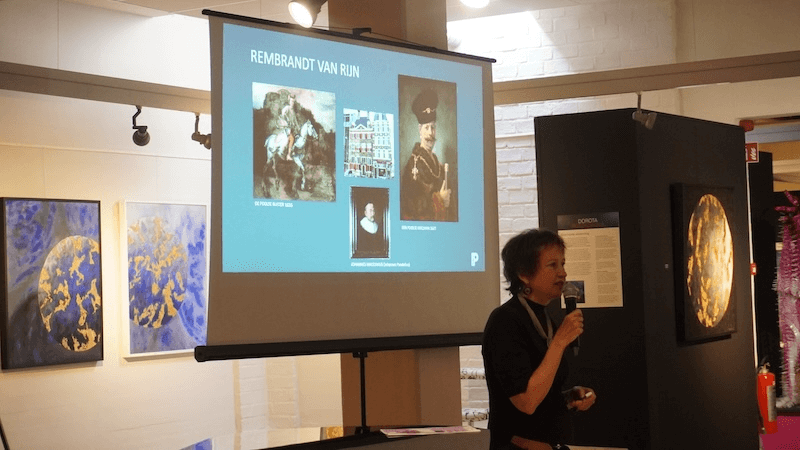
Programme
14.30
Doors open
15.00 – 15.05
Welcome
15.05 – 15.30
Polish traces in Amsterdam and the Nederlands
Bozena Kopczynska
15.30 – 15.55
Concert with music of F.Chopin and M.Szymanowska
Anna Ciborowska
16.00 – 16.25
Poolish contribution to liberation of the Netherlands
Hans Kardol
16.25 – 16.45
Break
16.45 – 17.10
De Polish Poster School
Paulina Matusiak
17.15 – 17.40
“Exprezz”
Anna Ciborowska and Cezariusz Gadzina
17.40 – 18.15
Drinks and tasting of Polish mini dishes
prepared by Dora Martinez Diplomatic Service (AVA Embassy Catering)
The supermarket Krakus will be present with the sale of Polish pottery from Bolesławiec, Polish beer, etc.
Presentations & Music
Presentation: Polish traces in Amsterdam and in the Netherlands
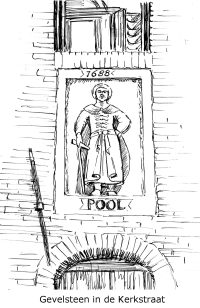
Bożena Kopczyńska
The Netherlands and Poland have more in common than you might initially think. The connections date back to the time of the Hanseatic League and the ‘mother trade.’ What this is, what these connections mean, and what you can still see of them today in, for example, the streets of Amsterdam, will become clear in this lecture. Did you know that many buildings in Amsterdam are built on wooden piles from Poland? As a multicultural city where new communities settled both now and in the past, Amsterdam has many visible traces of Polish immigrants. By bringing lesser-known historical facts to light, we hope to make Poland’s contributions more widely known.
The lecture will be given by Bozena Kopczynska. In addition to being the chairperson of the foundation Polish Culture NL, she is also co-author of the booklet “Polish Traces in Amsterdam” and regularly leads tours, which participants say offer a truly different perspective on the (own) city.
Music: Polish music of F. Chopin and M. Szymanowska
Anna Ciborowska
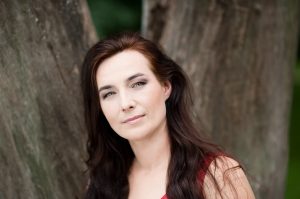
Polish music is rich and diverse due to its deep historical roots and various influences. From enchanting folk melodies and energetic mazurkas to the masterpieces of Chopin and contemporary jazz and rock—Polish music has the power to evoke emotions and tell stories. This unique blend of tradition and innovation makes it both timeless and captivating.
Anna Ciborowska is a pianist known for exploring rare and unconventional repertoire. Her discography includes works by contemporary composers like Rafał Stradomski and Gaston Compère, with whom she collaborated on two CDs, Polders and Lux Mea. She has also recorded Juliusz Zarębski’s Quintet for RTBF and Maria Szymanowska’s piano works, many of which were recorded for the first time. A passionate advocate for Szymanowska’s music, she also founded the Musique est une femme project. As a chamber musician, Ciborowska frequently performs with saxophonist Cezariusz Gadzina in the Exprezz Duo, with performances in renowned venues worldwide.
Presentation: Polish contribution to the liberation of the Netherlands
Hans Kardol
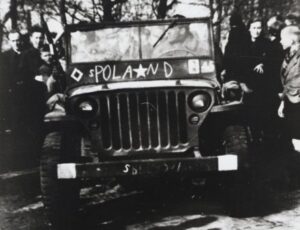
That Poland fought for our liberation during World War II is unknown or only partially known to many people. More and more people are becoming familiar with “The Polish Liberators of Breda” and the “Poles of Driel” who fought in Operation Market Garden. However, it is much less known, or even completely unknown, that traces of Polish liberators can be found throughout the Netherlands. This lecture introduces you to the Polish contribution and the price Poland paid for it. You will also discover how the Poles eventually ended up in the Netherlands from their homeland. For many, it was literally a world journey of several months, something we can now reach in a day in a borderless Europe. We will also discuss what World War II meant for the homeland of our liberators and why their liberation had to wait until 1989. Of course, we will also tell the story of one of the Polish war graves, which is easy to visit from Aalsmeer, as the traces are closer than you think.
The lecture will be given by Hans Kardol. He is the secretary of the foundation Polish Culture NL and the initiator of the portals “Polen in Beeld” and “Polish War Graves.” The presentation was organized together with the Driel Poland Foundation and is always very positively received.
Presentation: The Polish Poster School
Paulina Matusiak
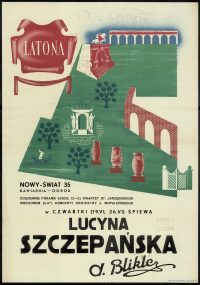
From the 1950s to the 1980s, the Polish Poster School combined the aesthetics of painting with the simplicity of the poster. In doing so, it developed its own distinctive style in a combination of painting, design, and color use, individual personality, humor, and imagination. The distinction between designer and artist blurred. Posters from the Polish Poster School significantly influenced the international development of graphic design in poster art. Their main contribution lies in the use of the power of suggestion through clever allusions. Using strong and vibrant colors from folk art, they combine printed slogans, often hand-written, with popular symbols to create a concise, inventive metaphor. One of the most well-known representatives of the Polish Poster School is Ryszard Kaja. In this lecture, you will certainly become familiar with his work, and, of course, examples of “Polish versions” of famous international films will be presented.
The lecture will be given by Paulina Matusiak, who graduated in typography and graphic design from the Royal Academy of Art in The Hague. She is the founder and owner of Studio Matusiak in Amsterdam and a winner of many awards, including for best book design. She was a juror at the Chaumont Poster Festival in France. She has also taught at the ArtEZ Academy for Art & Design in Zwolle and Enschede, and at the Academy for Visual Arts in Tilburg.
Music: Exprezz
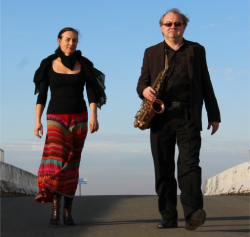
Anna Ciborowska and Cezariusz Gadzina
“Exprezz” is a meeting between jazz and classical musicians who come together to explore new forms of artistic expression by improvising in different styles.
Exhibition: Polska Pasja / Polish Passion
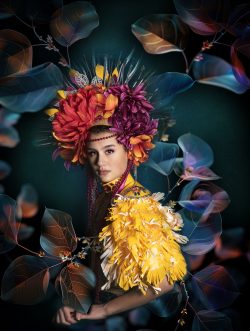
At the Flower Art Museum in Aalsmeer, there is an exhibition featuring nine Polish artists who live and work in the Netherlands. The exhibition includes not only paintings but also photographs, prints, textiles, unique decorative and functional objects, and costume designs.
Visitors can see paintings and handmade paper works by Maria Diduch, paintings by Krystyna Grzybowska, embroidery works by Iska van Kempen-Jarnicka, linocuts by Michalina Malolepsza, paintings by Justyna Pennards-Sycz , Dorota Roszkowska and Maugosia Sycz, as well as photographs by Daniel Kempisty and costume designs by Violetta Riedel from the Trash Design collection, made from waste materials such as plastic bottles, bags, or drinking straws. The works of the artists range from abstract to very realistic, referencing Flemish still lifes, but they are all united by their inspiration from nature, especially flowers.
Polish mini dishes
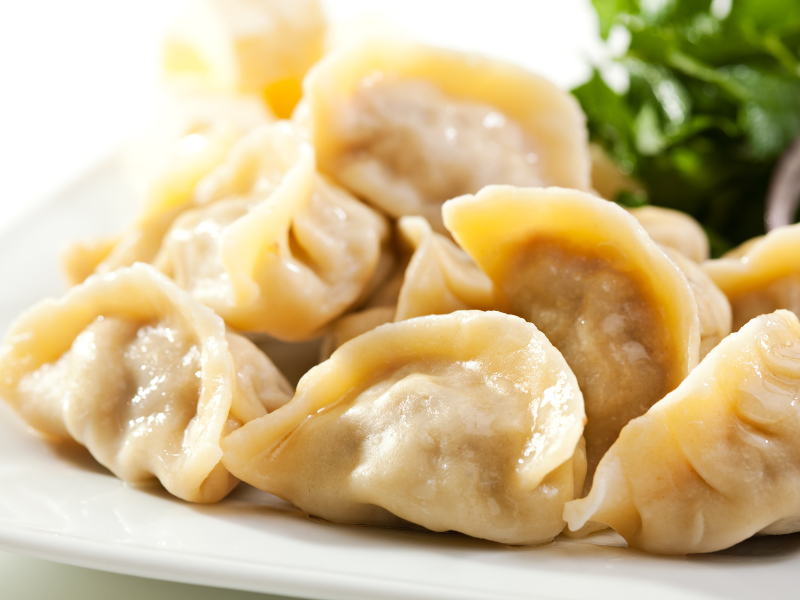
Food is an important part of Polish culture. Polish food is unique because of the combination of rich flavors, ancient traditions and various influences from Central and Eastern Europe. In the end of the afternoon, you will be able to taste delicious Polish mini dishes, carefully prepared by Dora Martinez Diplomatic Service (AVA Embassy Catering). In addition, the Krakus supermarket will be present with a selection of Polish pottery from Bolesławiec, Polish beer, and other specialties.
Partners and Sponsors

The organization is a collaboration between the Polish Culture NL Foundation and the Flower Art Museum.

This event is made possible by the support of the Cultuurfonds, with the Lisetta Stembor Fund contributing to this financing.

